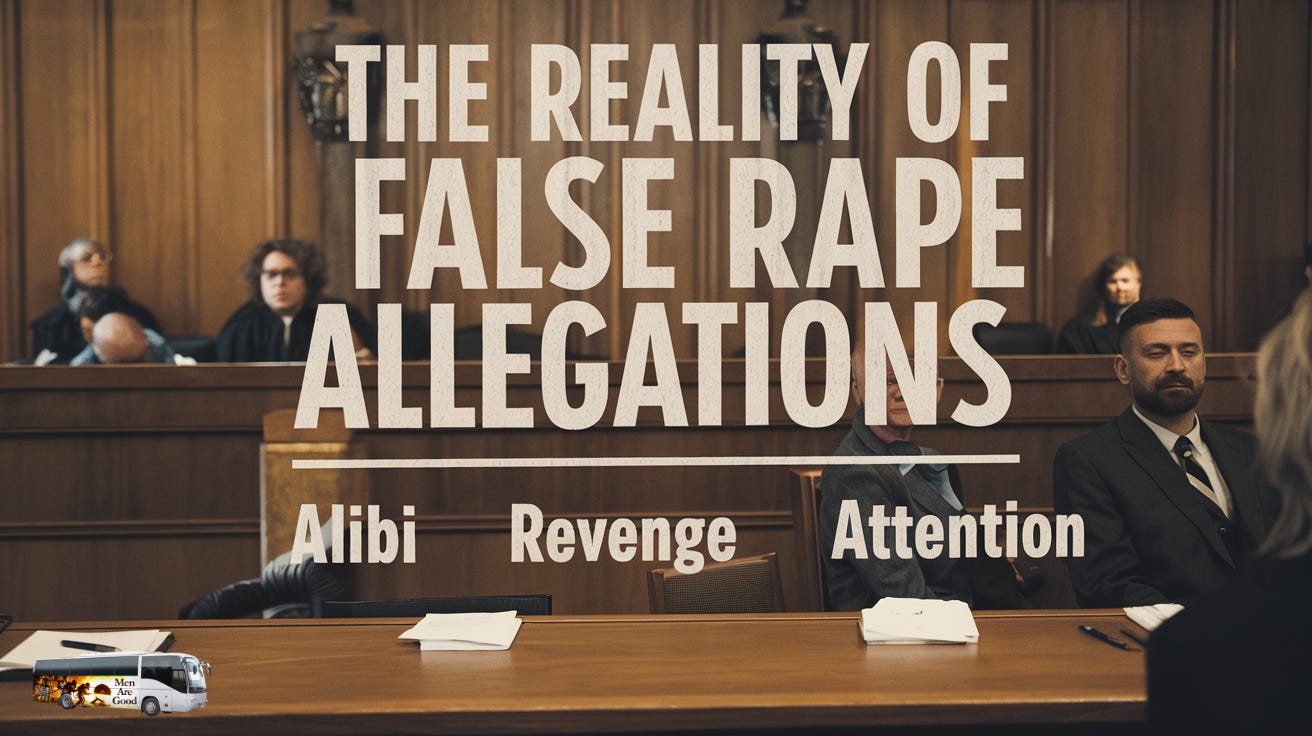
Throughout history, no culture has believed that all people are inherently truthful, although some societies have put great trust in people while imposing severe penalties for dishonesty. The feminist movement, however, introduced the idea that women, specifically, should be believed without question. The slogan "Believe all women" became prominent, following years of advocacy suggesting that women, as a group, are inherently pure and trustworthy. One especially controversial claim has been that women never lie about rape.
This idea faced backlash when public figures and researchers provided data to the contrary. For instance, Linda Fairstein, a former Manhattan district attorney, estimated that false rape accusations in cases she observed ranged from 40-50%. Feminist circles reacted strongly, as they also did to Charles McDowell’s research, which suggested that approximately half of all rape allegations were false. Why does this narrative provoke such a reaction? The answer may lie in the feminist movement's reliance on relationally aggressive strategies—social tactics that depend on an unquestioned acceptance of women's statements. Casting doubt on the veracity of such claims could undermine the foundation of these strategies. Without the prevailing assumption that women always tell the truth, feminism would lose much of its power.
Why is it important to question and even dismantle these myths of women's global truthfulness? Several reasons. First, men are facing serious hardships due to false accusations, which are notoriously difficult to disprove. A quick look at the Innocence Project reveals that the vast majority of cases they overturn and release an innocent man from prison, involve wrongful convictions for rape. There is also a total ignorance and indifference to the severe trauma men go through when falsely accused. For some reason it just doesn't seem to matter. It is also important to hold the false accuser accountable, not only for the sake of the accused but also for the sake of the false accuser. Allowing someone to live in a lie is quite hurtful. Another reason is that this "believe women" myth serves as a foundational pillar of feminist narratives. Without it, their arguments and reason for being fall apart. Any movement or group that relies on falsehoods for legitimacy needs to be challenged, dismantled, and thrown into the dustbin of history.
Despite various studies showing significant percentages of false accusations, feminist efforts have often focused on vehemently downplaying or dismissing these findings. One example is the study by Eugene Kanin, whose research has faced massive efforts to limit its visibility and acceptance. This article will explore Kanin’s study, its findings, the importance of his work, and the criticisms it received.
Evaluating Eugene Kanin’s Study on False Rape Allegations: Findings, Motivations, and Criticisms
Eugene Kanin’s research on false rape allegations, conducted in the early 1990s, stands as one of the most cited and revealing studies in discussions about the complexities of sexual assault accusations. His work, which involved analyzing recanted rape allegations in both a small Midwestern police department and later at two universities, concluded that a surprisingly high percentage of accusations were false.
Kanin’s study in the police department covered several years and was based on a set of strict guidelines for determining when an accusation could be classified as false. His limiting false allegations to only those women who admitted they had lied was aimed at eliminating any ambiguity about the truth of the accusation. Furthermore, the complainants were informed that admitting to a false allegation could potentially lead to fines and legal consequences, thereby adding an element of deterrence against easy recantations.
In his findings, Kanin reported that 41% of the accusations made to the police department were determined to be false. This meant that the accuser admitted to her false accusation and also explained her reasons for lying. When he later conducted a similar study on two university campuses, he found an even higher rate of 50%. I am guessing that Kanin was aware that his findings would be controversial and therefore documented a range of personal motivations of the false accusers. This was brilliant on Kanin's part. It is simple to disregard numbers but not so easy to ignore actual stories of women falsely accusing. Hearing the actual stories of women lying about rape is a very powerful way of making it real and makes it much more difficult for the average person to deny. Let's take a look at the three categories of motives for lying and the actual stories Kanin related in his study.
Motivations for False Allegations
Kanin’s study didn’t just focus on the rate of false accusations; he also explored why individuals might be driven to make these claims. By examining the reasons behind each recanted report, he identified three recurring motives, revenge, providing an alibi, and seeking attention.

1. Revenge
One of the primary motivations Kanin found was revenge. Twenty-seven percent (n = 12) of the cases clearly seemed to serve this function. In some cases, complainants used false allegations to retaliate against individuals who had hurt them, betrayed them, or otherwise caused them emotional pain. Revenge as a motive is a powerful factor, especially in situations where the accused had a close or personal relationship with the accuser.
These are examples taken directly from the Kanin study, of women with a revenge motive for the false accusation of rape:
1. An 18-year-old woman was having sex with a boarder in her mother's house for a period of 3 months. When the mother learned of her behavior from other boarders, the mother ordered the man to leave. The complainant learned that her lover was packing and she went to his room and told him she would be ready to leave with him in an hour. He responded with "who the hell wants you." She briefly argued with him and then proceeded to the police station to report that he had raped her. She admitted the false charge during the polygraph examination.
2. A 17-year-old female came to headquarters and said that she had been raped by a house parent in the group home in which she lived. A female house parent accompanied her to the station and told the police she did not believe that a rape had occurred. The complainant failed the polygraph examination and then admitted that she liked the house parent, and when he refused her advances, she reported the rape to "get even with him."
3. A 16-year-old reported she was raped, and her boyfriend was charged. She later admitted that she was "mad at him" because he was seeing another girl, and she "wanted to get him into trouble."

2. Providing an Alibi
Kanin’s research also found cases where individuals filed false allegations to create an alibi for themselves, often to avoid criticism or punishment for consensual actions that might be frowned upon by family, friends, or partners. Approximately 56%, (n = 27) were in this category.
1. An unmarried 16-year-old female had sex with her boyfriend and later became concerned that she might be pregnant. She said she had been raped by an unknown assailant in the hopes that the hospital would give her something to abort the possible pregnancy.
2. A married 30-year-old female reported that she had been raped in her apartment complex. During the polygraph examination, she admitted that she was a willing partner. She reported that she had been raped because her partner did not stop before ejaculation, as he had agreed, and she was afraid she was pregnant. Her husband is overseas.
3. A divorced female, 25 years of age, whose parents have custody of her 4-year-old child. She lost custody at the time of her divorce when she was declared an unfit mother. She was out with a male friend and got into a fight. He blackened her eye and cut her lip. She claimed she was raped and beaten by him so that she could explain her injuries. She did not want to admit she was in a drunken brawl, as this admission would have jeopardized her upcoming custody hearing.
4. A 16-year-old complainant, her girlfriend, and two male companions were having a drinking party at her home. She openly invited one of the males, a casual friend, to have sex with her. Later in the evening, two other male acquaintances dropped in and, in the presence of all, her sex partner "bragged" that he had just had sex with her. She quickly ran out to another girlfriend's house and told her she had been raped. Soon, her mother was called and the police were notified. Two days later, when confronted with the contradictory stories of her companions, she admitted that she had not been raped. Her charge of rape was primarily motivated by an urgent desire to defuse what surely would be public information among her friends at school the next day, her promiscuity.
Such examples illustrate how the desire to avoid criticism or punishment can lead to false accusations as a defensive strategy.

3. Attention Seeking
The third major category Kanin identified was those seeking sympathy and attention. Approximately 18% (n = 8) of the false charges clearly served this function.
1. An unmarried female, age 17, abruptly left her girlfriends in the park one afternoon allegedly to go riding with a young man, a stranger she met earlier that morning who wanted her to smoke marijuana with him. Later that day, she told her friends she was raped by this man. Her friends reported the incident to the police, and the alleged victim went along with the rape charge because "I didn't want them to know that I lied to them." She explained that she manufactured this story because she wanted the attention.
2. An unmarried female, age 17, had been having violent quarrels with her mother who was critical of her laziness and style of life. She reported that she was raped so that her mother would "get off my back and give me a little sympathy."
3. An unmarried female, age 41, was in post divorce counseling, and she wanted more attention and sympathy from her counselor because she "liked him." She fabricated a rape episode, and he took her to the police station and assisted her in making the charge. She could not back out since she would have to admit lying to him. She admitted the false allegation when she was offered to be polygraphed.
What is learned?
Hearing statistics about false allegations is one thing. It's easy for some to argue about them and downplay their importance. But when confronted with real stories of women making false accusations, it’s much harder to dismiss. These stories make clear that false allegations of rape do exist, challenging feminist assumptions about female purity and inherent trustworthiness. To me, they prove beyond a shadow of a doubt that false accusations occur and often go unnoticed.
In Kanin’s study, over 40% of rape allegations were determined to be false—meaning a woman lied, and her lie could have put an innocent man in jail. What kind of mindset does it take to do that? I believe it reflects a highly narcissistic individual, someone who thinks only of themselves, has poor impulse control, low empathy, and a lack of accountability. People like this do exist, and Kanin’s findings remind us that some women are capable of such actions. This reality should dismantle the feminist argument that false rape allegations don’t happen. They do happen, and that should compel us to protect innocent men from such harm. The feminist push to deny the possibility of false allegations has led to reduced safeguards for accused men, making it almost unquestionable to challenge an accuser. This system of unchecked allegations encourages dishonesty and must change.
Criticism
Did this study impact the feminist movement? Not at all. In fact, you may have never even heard of it, likely due to what’s known as the "lace curtain"—an invisible filter that blocks information contradicting feminist objectives. It seems to have worked effectively to keep this study under wraps.
Some criticisms of the study centered on the definitions of false accusations and whether some findings could reflect recantations due to external pressures or fear rather than actual falsification. This criticism seems unfounded to me. Did they even read the Kanin study? The women in his study explained in detail why they lied, and their explanations aligned with their false reports. It all made sense. These weren't ambiguous cases; Kanin’s study captured them clearly. Yes, these women may have felt fear—but that’s unsurprising, as their lies had been exposed.
One predictable feminist critique was that findings like Kanin's could deter actual victims from reporting rape. Sure enough, some argued that his study might reinforce harmful stereotypes and discourage reporting. I think the opposite is true. Kanin's research could instead deter false accusers from making the damaging decision to ruin an innocent man’s life. Some of those so-called “harmful stereotypes” are, in reality, justified concerns with real consequences.
There were also claims that Kanin's study was a statistical outlier and therefore irrelevant. This, of course, is incorrect, as similar findings emerged from studies at the Air Force Academy, which reported false accusation rates comparable to Kanin’s. Many law enforcement professionals have also corroborated these findings, sharing similar estimates based on their field experience. Other studies have shown that false rape allegations do exist, though often at lower rates. But even if the rate is as low as 2%, that should still compel us to protect the innocent from the devastation of a false accusation. Like any other crime, a rape charge must be proven true.
The only valid criticism I found of the Kanin study is that the sample was too small and lacked diversity. While this limits the ability to generalize its findings, it doesn’t diminish the importance of shedding light on the reality of false accusations of rape.
Conclusion
Eugene Kanin’s study serves as a powerful reminder of the complexities surrounding rape allegations and the necessity of addressing false accusations with the seriousness they deserve. His meticulous documentation of motives and real-life cases underscores a truth often downplayed or ignored: false allegations happen, and their consequences can be devastating, particularly for the falsely accused. While the feminist narrative often dismisses or obscures such findings, the evidence from Kanin’s research and similar studies calls for a more balanced approach—one that ensures justice for actual victims while safeguarding the rights of the accused.
Challenging the myth that women always tell the truth about rape is not about silencing victims; it is about ensuring fairness and accountability in a system where both are often lacking. By ignoring the reality of false accusations, society perpetuates a dangerous double standard that harms everyone involved. Men falsely accused face irreparable damage to their reputations, careers, and mental health, while the broader justice system suffers a loss of credibility.
It is essential to engage in honest discussions about these issues, free from ideological bias, to build a justice system rooted in fairness and truth. Acknowledging and addressing the existence of false rape allegations is not only a matter of justice but also a step toward restoring faith in a system too often swayed by cultural narratives rather than evidence.
I wanted to write this article as a prelude to the next installment in this series on gynocentrism, specifically focusing on how feminists have weaponized it to silence men. Much of their advocacy for increased benefits for women has been built on falsehoods, including lies and false accusations—particularly those targeting men. The next post will delve deeper into this issue.
Kanin’s Research https://www.aals.org/wp-content/uploads/2015/06/Bowen-Kanin-False-Rape-Empirical.pdf


















